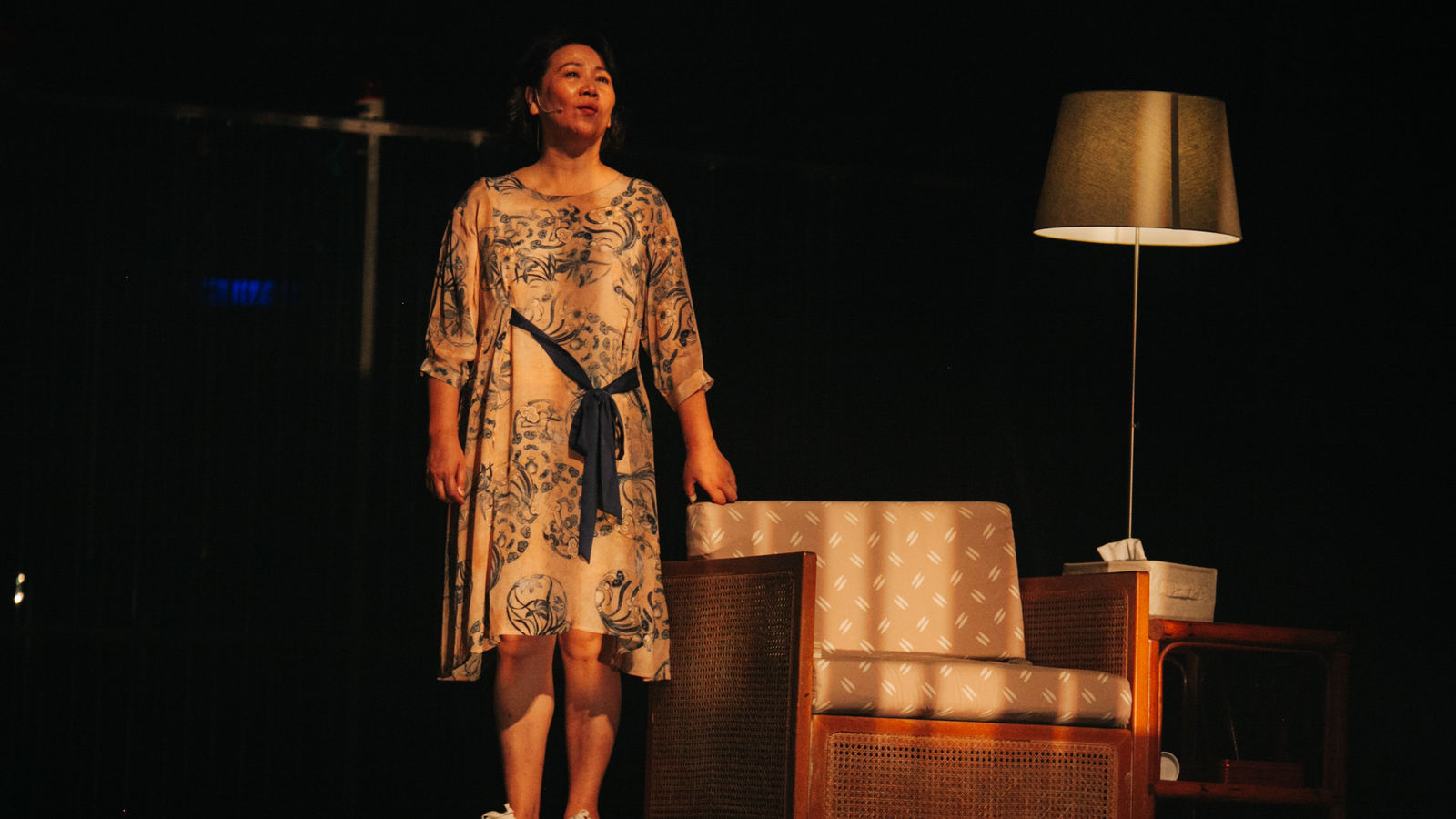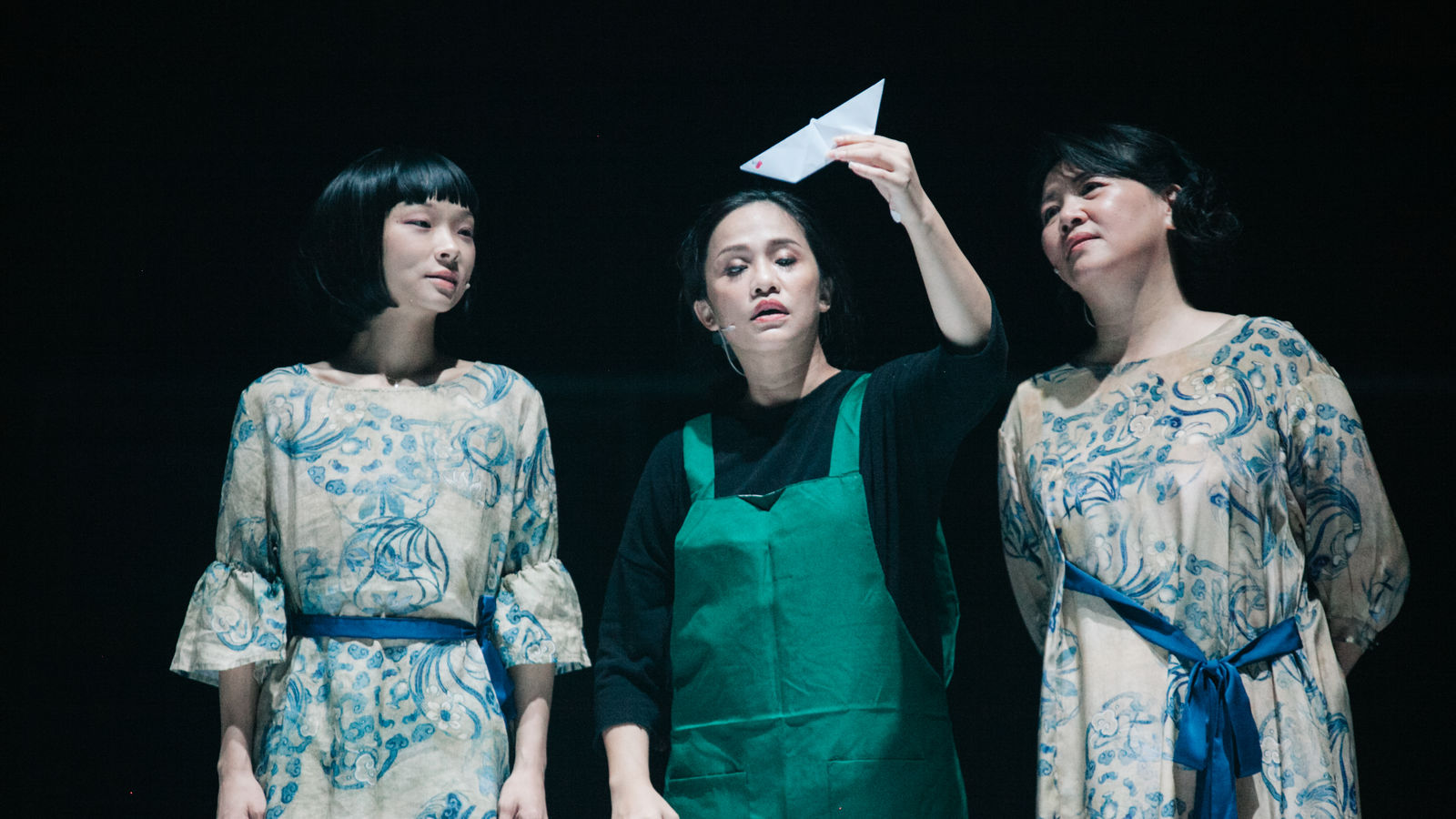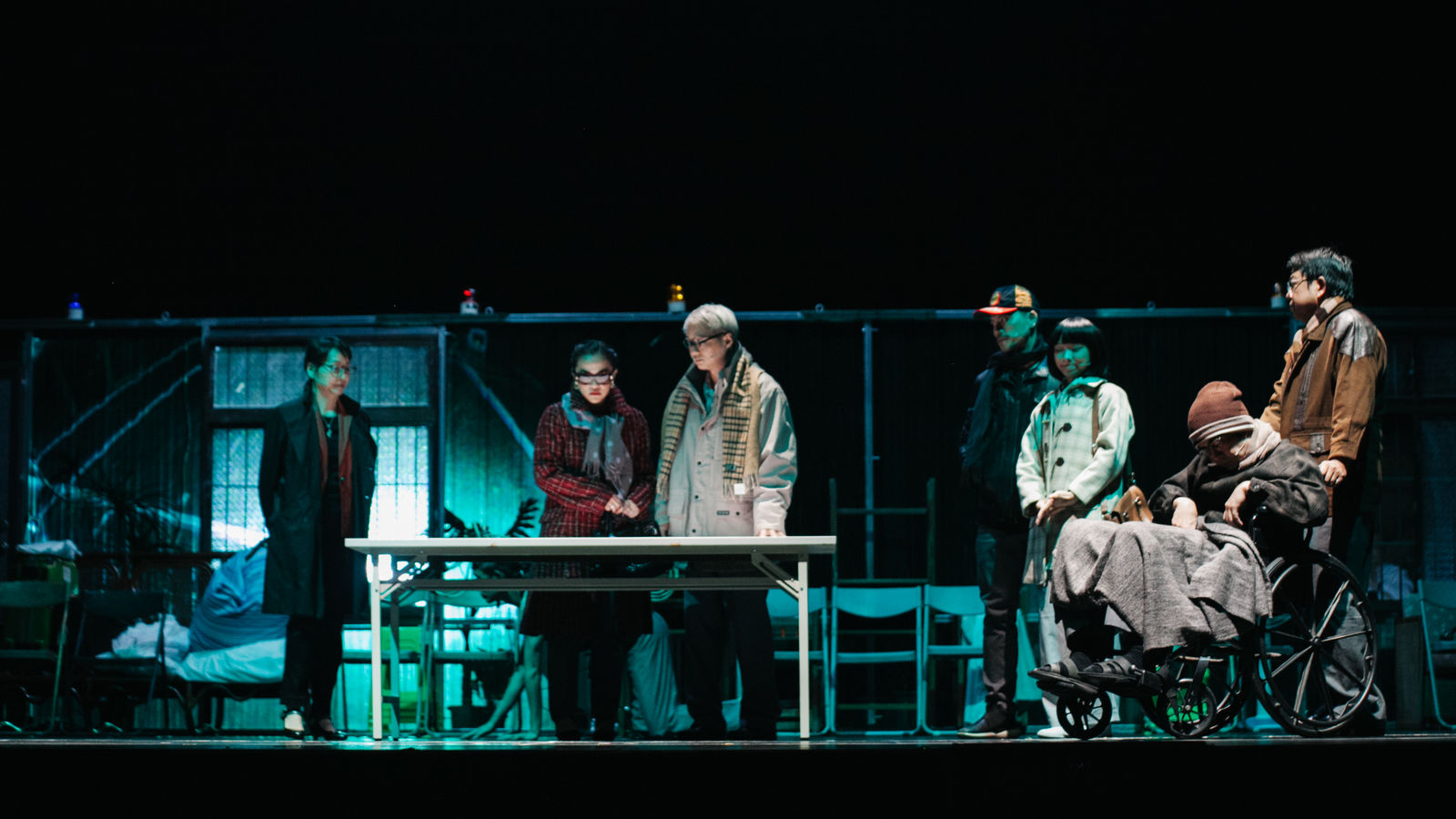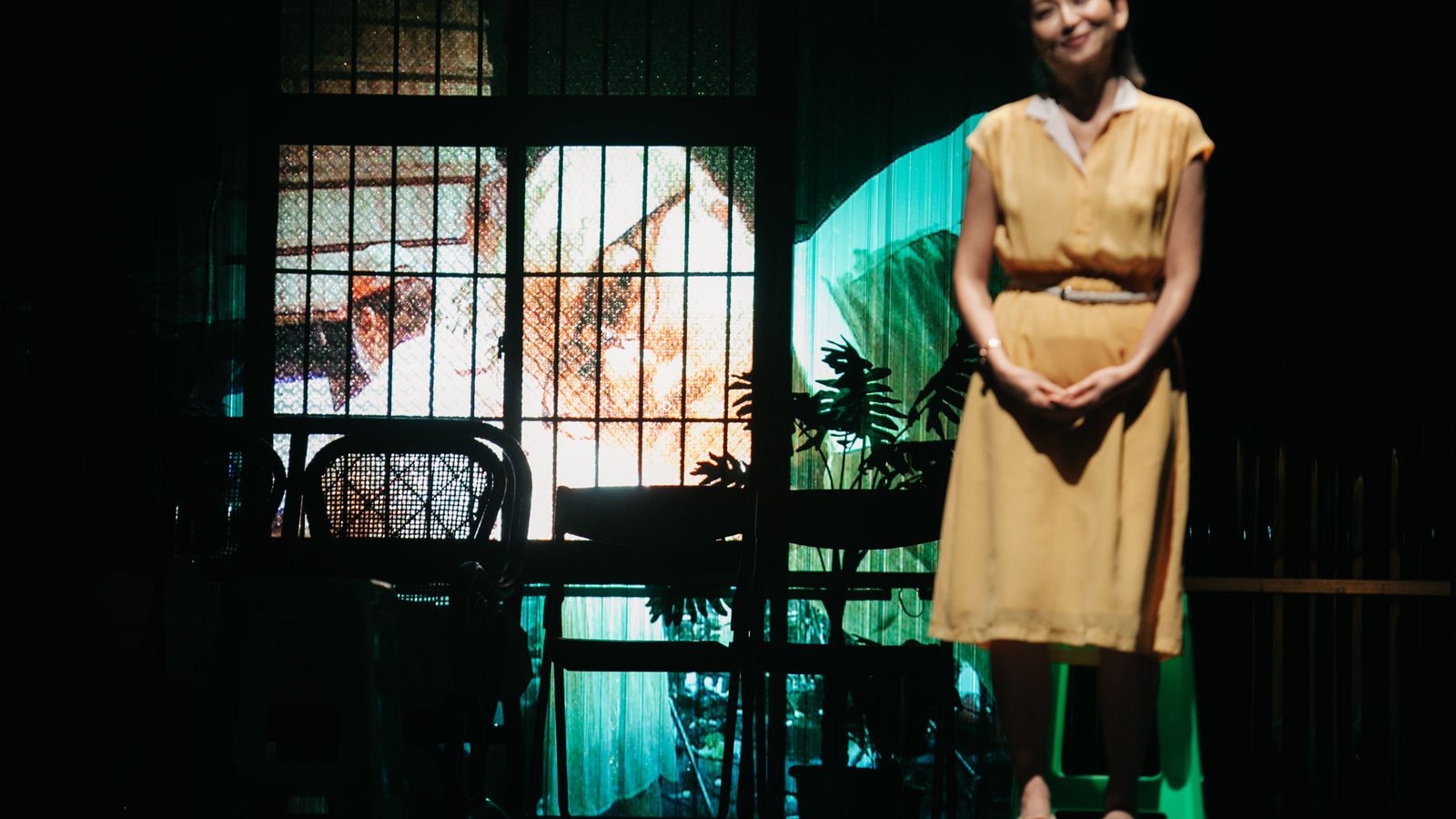









FIND 2023
Between the Lines with Shakespeare’s Wild Sisters Group
by Joseph Pearson
12 April 2023
I happen to be in Taiwan when the Schaubühne asks me to interview Wang Chia-Ming, the director of Shakespeare’s Wild Sisters Group, an avant-garde theatre company based in the capital. The group send me a photograph of their unmarked door, and indications to the third floor, which I find through a warren of mannequins and wigs in a busy clothing market. It seems a magic trick that, out of so much metropolitan clamour, I should emerge into a spacious hard-wooded rehearsal space, and the company’s offices, that seem to float, just a little, above the mega-city. Members of the company, including Chia-ming and his translator, greet me; we exchange polite bows and begin our conversation.
Wang Chia-ming is expressive and thoughtful, with smiles and ideas passing visibly over his face. I am intrigued that he has chosen a Canadian text as the basis for the theatre piece, »Dear Life« (親愛的人生). The book of short stories of the same name is by Nobel prize-winning writer Alice Munro, and its landscapes are more familiar to me––my family is in Vancouver––than the lush Taiwanese mountains, like tropical furry beasts, or the sparkling density of Taipei. Wang Chia-ming’s »Dear Life« was first brought to Europe for the Festival d’Automne in Paris in 2019, and its German premiere will be during FIND 2023.
He tells me, »Canada is far from us but close to you. I majored in geography, and I think about the large geographical differences between Taiwan and the scenery of Munro’s books. The seasons, the landscape––it is all so different, not just the temperature. I originally just wanted to set Munro’s stories, but I thought that, with all these differences, how could we put these actors before a Taiwanese audience with the scenery that Munro created? Perhaps, instead, we could rewrite the stories for Taiwan«.
But he did not begin with Alice Munro. Wang Chia-ming knew he wanted to tell four stories in one night, each thirty minutes. Alice Munro’s story writing––of which he’s read almost everything––provided the correct, almost Chekhovian, vehicle.
»I saw something in her strategy of observation. The differences between theatre and short story writing are enormous, in terms of how much information can be talked into a performance as opposed to a literary work. What intrigued me about Munro was the number of gaps or blanks in her style: she allows readers to create their own stories. She often writes about the scenery. Talking about surroundings, such as the space or objects, brings us to the characters. This reminded me of traditional Chinese literature, especially the poetic tradition, where we often describe the scene to allow the audience to understand the feeling behind that scene, but without talking about the feeling directly«.
He refers then to a quotation from »Autumn Thoughts« by the 13th-century poet and dramatist Ma Zhiyuan: »Dried vines, old tree, dusky crows, small bridge, and flowing water…« as an example of the hermetic, poetic openness he aspires to.
»Because each story is only thirty minutes long«, he tells me, »I think about each scene through these kinds of poems. How can I write a short script that still provides a lot of information, creates a certain atmosphere on stage with the actors, and leaves enough blank spaces for the audience to imagine? When we selected some of the stories from Munro’s book, I asked the actors to act them out on stage so we could know exactly how little information we could give the audience so that they would still understand what is happening on stage. And then, a large difference between reading fiction or sitting in a theatre, naturally, is the experience of time…«
Chia-ming produces a large piece of paper on which he draws four diagrams, each representing one of the four stories in the production. They appear like a graphic score.
»The four stories are not connected by plot, but rather musically: the connections between them are similar to a musical structure. Each diagram suggests both the movement of the actors on stage and the density of the words they use. In this way, there is a combination of sight and hearing. The first of the four stories is like a camera aperture divided into fourteen pieces. The second is many round tables on stage, around which people move, creating a curved line. The third has someone standing in the middle but not moving, while the fourth combines the three preceding diagrams. The structure is symphonic«.
Chia-ming’s script sets Munro’s plots not in the particularity of a rural town in Ontario or the loneliness of a city in British Columbia. He chooses instead Taoyuan, a separate city but in practice a Taipei suburb, where the international airport is located.
»It’s actually very close to us, next to our city, but we are very unfamiliar with that place, because it is not a touristy place. We are more familiar with Hualien or Tainan or other Taiwanese cities than a place that is close to us. But if you leave the airport, you will land in Taoyuan. It’s an awkward place. People do not travel there except to travel. We always fly past that place but we never stop there«.
»In this place, I try to focus more on female characters. I also try to write into the script something with which the actor is familiar, but also something with which they are not familiar. For the contrast. There was this scene in Munro’s story, about a woman sitting on the bus going to jail to visit her husband. I turned this into a girl taking a bus to this suburb of Taipei, to visit her mom’s grave. But both stories have something that there is a lot of in Munro’s writing: the order in which she writes will often create the impression that something will happen later, but it has happened already«.
We have spoken already more than an hour and I don’t want to keep my hosts for too long, also happy that we will see each other on another continent in a month. But I ask, »Is there anything we should speak about that we have not?«
Wang Chia-ming laughs, »I will leave you some blanks so you can imagine«.
親愛的人生 (Dear Life)
(Taipei)
Shakespeare’s Wild Sisters Group
by Wang Chia-ming
Director: Wang Chia-ming
Stage A
Premiered on 29 April 2023
Pearson’s Preview

Archive
April 2024
Icy Myths in the Russian East
The Exiles of KnAM’s »My Little Antarctica« at the Schaubühne
April 2023
FIND 2023
Nostalgic, Not Sentimental
The Wooster Group as »Artist in Focus« at the Schaubühne
| Page 1 of 10 pages |
